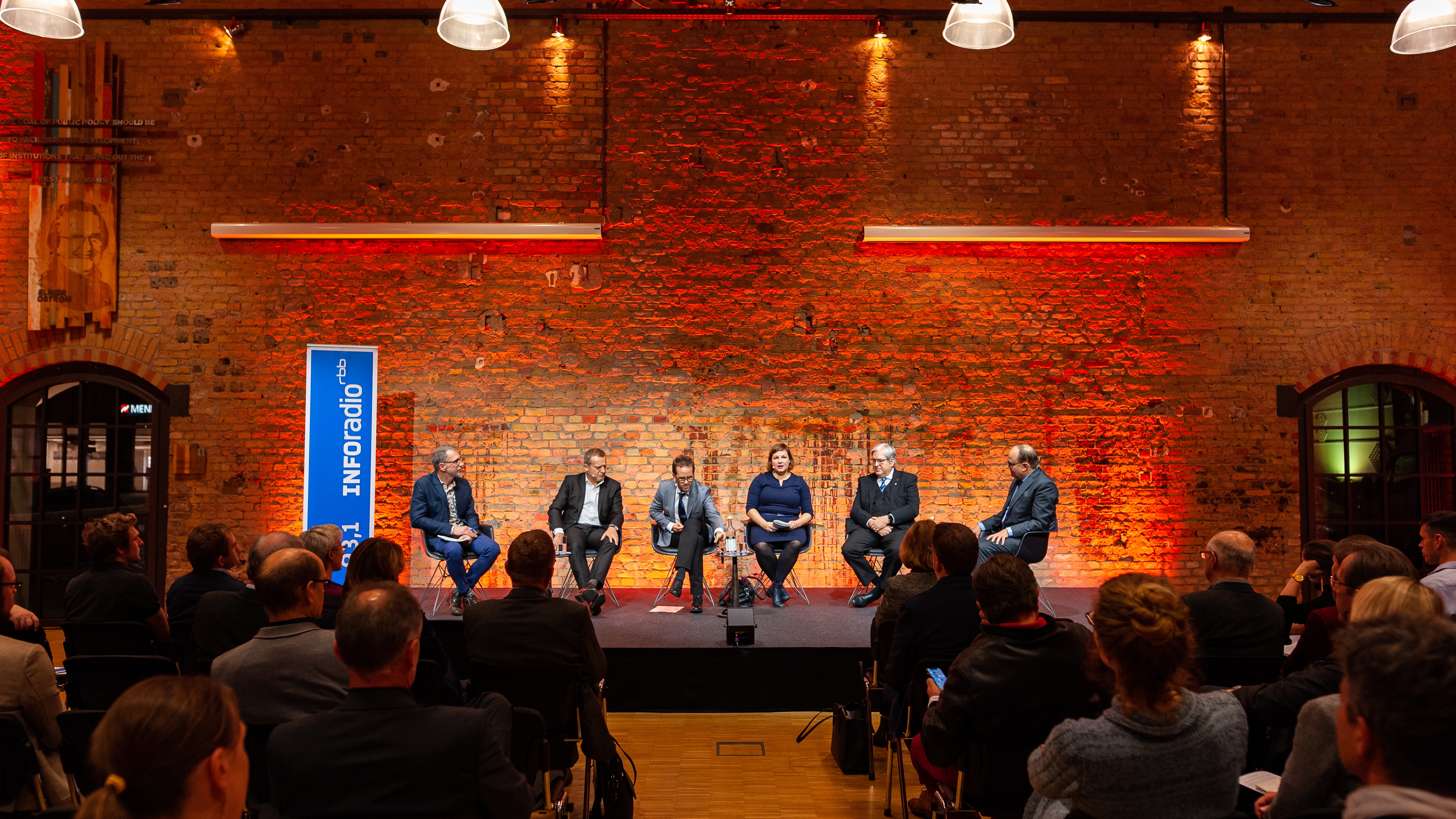
Designing climate protection in a socially equitable way – is it actually possible?
Dialogue Forum on 3 December 2019
properties.trackTitle
properties.trackSubtitle
Climate change is happening and it is influencing people’s lives – all over the world. This is a fact. There is a lot of disagreement about how we can protect our climate – at both national and international level. At the preliminary evening in Berlin in advance of the Dialogue Forums 2020 “Climate change, climate protection – is there still hope?”, the focus was on the question of whether and how we can design climate protection in a socially equitable way.

Cautious measures
The climate package approved by the German Federal Government in autumn 2019 looks to reward parties who emit less carbon into the atmosphere. Train travel is to become cheaper, and air travel more expensive. Petrol prices are expected to rise, and the phasing out of coal use to be fully achieved in 20 years’ time. Are we on the right track with this climate package? Professor Ottmar Edenhofer, Director of MCC, was sure that the cost and consequences of inaction would only be felt in 20, 30, or even 40 years. He considered that the climate package measures and the proposed carbon charge were much too cautious. Because of this, he argued, the result was not sufficiently socially balanced, and gave no clear answer to the question of who is to bear the burden for climate protection measures today.
Klaus Müller, Chair of the Federation of German Consumer Organisations, likewise believed that the climate path the government had taken was creating a serious imbalance. He argued that it would be neither effective, nor socially equitable, and feared that the financial relief measures included would not reach the intended people. He added that the consumer should never be forced to subsidise the government or corporations. Mr Müller also reminded the audience that, because of the low carbon charge, people would not really perceive the effectiveness of the climate package. €10 for each tonne of carbon emitted – which is the starting charge – was too little. Yet the carbon charge plays a key role in the climate package.

Carbon charge as the crucial issue
Germany must meet its European obligations, under which it needs to reduce its carbon emissions by 38% by 2030 compared to 2005. Otherwise, it will become even more expensive because heavy fines will have to be paid. “The costs saved in the climate package will then come back to bite us,” warned Ottmar Edenhofer. And he pointed out that the new EU commission is likely to tighten further the climate targets for EU states. Germany needs to have a general debate on how all the climate protection measures are to be financed. Edenhofer argued that the overall system for charges and taxes in the energy sector needed to be changed.
Difficult structural change
Climate protection means structural change, and a rethink in business and politics. “German industry has been asleep for too long,” said Antje Kapek, Berlin Chair of the parliamentary party, Bündnis90/die Grünen. At the same time, politicians were not offering enough incentives for electrification. Roman Zitzelsberger, District Manager for Baden-Württemberg at the trade union IG Metall, called for the process to be accelerated immediately and for Germany to effect the change. He said that there was no alternative to abandoning the internal combustion engine and switching to electric mobility. Zitzelsberger added that renewable energies had to be introduced quickly in Germany. This meant purchasing German electric buses in Germany, he warned, instead of stockpiling them.
“Structural change has to be organised, and there will always be winners and losers,” Edenhofer added. “It is the job of politicians to cushion the losses from the structural change as much as possible. The losers need to be protected.” He said that labour market instruments could cushion the impact on the losers. Professor Jörg Steinbach pointed out that politicians were currently spending too much time on client politics, and not putting enough pressure on car companies. Professor Steinbach is the State of Brandenburg’s Minister for Economics and Energy. Too many lazy compromises were also being reached on the carbon charge, he said.
Combat anti-climate politics
Jörg Steinbach drew attention to the urgent problems of social instability in Brandenburg and all of eastern Germany: “Everyone with green political opinions is driving voters towards the AfD party,” he warned. “People working in the lignite mining industry are now seen as national pariahs.” They are often extremely critical and not easy to convince. For that reason, such people often come together in parties that either downplay or deny outright that climate change is happening. Ottmar Edenhofer perceived an existent phenomenon of social tensions between elite and non-elite classes – and one that was being witnessed worldwide. People’s trust in politicians was beginning to erode, he said. The economist and climate scientist called for urgent measures to build political trust in order to combat right-wing populism also in the area of climate policy.

Climate protection as an opportunity
But Antje Kapek was convinced that climate protection could also be fun. She said it was nice to pursue the goal of fighting for a liveable and healthy world. Climate protection made the world greener and healthier. “That gives you the opportunity of developing a new attitude to life,” she argued. But she added that it was the job of politicians to highlight feasible solutions and alternatives for people. This was something we needed to work on.
The next evening in the Dialogue Forums 2020 series, entitled "The climate policy dilemma - sign, ratify and continue as before?", will be held on 23 January 2020, then again in Munich.
5 December 2019